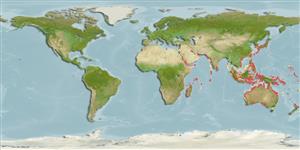Polychaeta |
Phyllodocida |
Polynoidae
Environment: milieu / climate zone / depth range / distribution range
Ecology
Benthic; depth range 0 - 20 m (Ref. 8195). Tropical
Indo-West Pacific.
Length at first maturity / Size / Weight / Age
Maturity: Lm ? range ? - ? cm
Found on muddy substrates (Ref. 105057). Also on hard bottoms, subtidal (Ref. 107160). Polynoids in general are considered carnivores, feeding on small crustaceans, echinoderms, polychaetes, gastropods, sponges and hydroids (Ref. 108044). Uses a jawed pharynx to feed (Ref. 125928).
Life cycle and mating behavior
Maturity | Reproduction | Spawning | Eggs | Fecundity | Larvae
Members of the class Polychaeta are mostly gonochoric (sexual). Mating: Females produce a pheromone attracting and signalling the males to shed sperm which in turn stimulates females to shed eggs, this behavior is known as swarming. Gametes are spawned through the metanephridia or body wall rupturing (termed as "epitoky", wherein a pelagic, reproductive individual, "epitoke", is formed from a benthic, nonreproductive individual, "atoke"). After fertilization, most eggs become planktonic; although some are retained in the worm tubes or burrowed in jelly masses attached to the tubes (egg brooders). Life Cycle: Eggs develop into trocophore larva, which later metamorph into juvenile stage (body lengthened), and later develop into adults.
Wehe, T. 2006 Revision of the scale worms (Polychaeta: Aphroditoidea) occurring in the seas surrounding the Arabian Peninsula. Part I: Polynoidae. Fauna of Arabia 22:23-197. (Ref. 8195)
IUCN Red List Status
(Ref. 130435: Version 2025-1)
CITES status (Ref. 108899)
Not Evaluated
Not Evaluated
Threat to humans
Human uses
| FishSource |
Tools
More information
Trophic EcologyFood items (preys)
Diet composition
Food consumption
Predators
Population dynamicsGrowth
Max. ages / sizes
Length-weight rel.
Length-length rel.
Length-frequencies
Mass conversion
Abundance
Life cycleReproductionMaturityFecunditySpawningEggsEgg developmentLarvae PhysiologyOxygen consumption
Human RelatedStamps, coins, misc.
Internet sources
Estimates based on models
Preferred temperature
(Ref.
115969): 15.7 - 29.2, mean 28 (based on 3022 cells).
Price category
Unknown.
